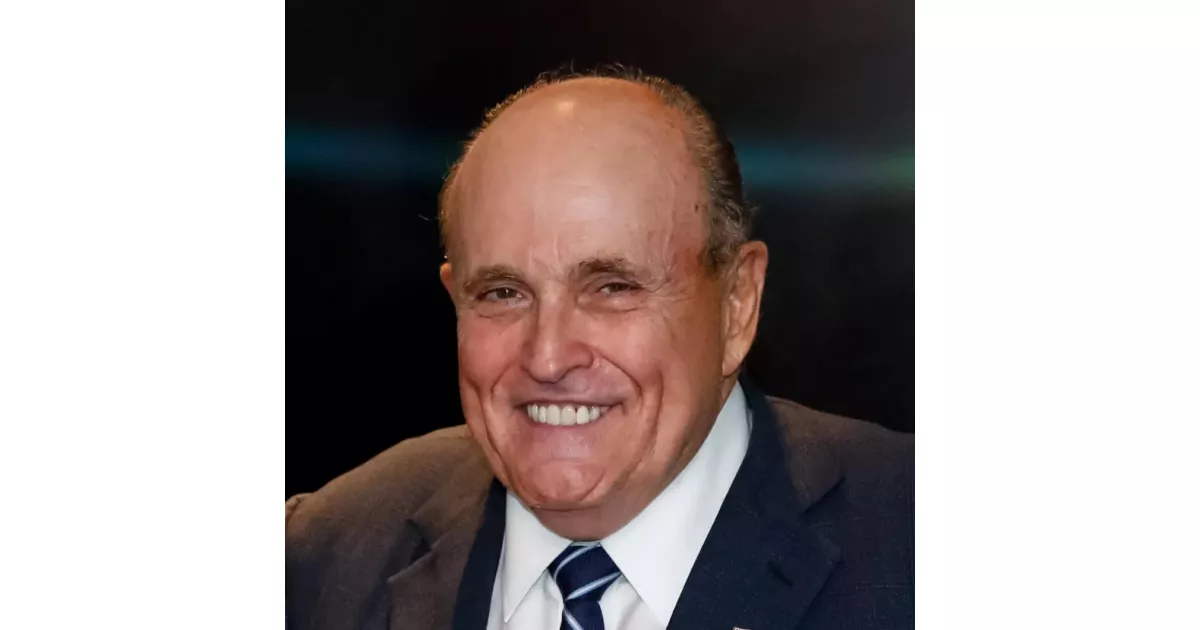A closer look at the defining struggles that shaped Rudy Giuliani's life and career.
Rudy Giuliani is an American politician and disbarred lawyer best known for serving as the 107th Mayor of New York City from 1994 to 2001. Prior to his mayoral tenure, he held significant positions within the Department of Justice, including United States Associate Attorney General and United States Attorney for the Southern District of New York. While initially admired for his leadership, particularly after 9/11, his later career has been marked by controversy, leading to his disbarment.
1993: Ineffective Radios Following 1993 World Trade Center Bombings
Following the 1993 World Trade Center bombings, the radios used by the fire department were criticized for their ineffectiveness. These radios were still in use during the 9/11 attacks, despite years of complaints from emergency services responders. The 9/11 Commission Report noted that the lack of preparedness, including the faulty radios, could have led to the deaths of first responders during the 9/11 attacks.
1993: World Trade Center Bombing
In 1993, the World Trade Center bombing occurred, which was cited by opponents of Giuliani's decision to locate the New York City Office of Emergency Management headquarters inside the 7 World Trade Center building. They perceived the office as a potential target for future terrorist attacks.
1993: Faulty Analog Radios
In 1993, the radios used by firefighters were old and analog. A mayoral office study in 1994 indicated they were faulty, and in March 2001 the replacement radios were recalled, leaving firemen with the old analog radios from 1993
1994: Mayoral Office Study of Faulty Radios
In 1994, a mayoral office study indicated that the radios used by firefighters were faulty. This study highlighted the need for replacement radios, which were later purchased in a no-bid contract with Motorola.
February 1996: Hauer's Memo Recommending Brooklyn Location
In February 1996, a memo from Jerome Hauer recommended locating the emergency command center in Brooklyn, citing security concerns about buildings in Lower Manhattan. The memo stated, "The [Brooklyn] building is secure and not as visible a target as buildings in Lower Manhattan."
May 1997: Giuliani Blames Hauer for WTC Location Decision
In May 1997, Giuliani attributed the responsibility for selecting the location of the New York City Office of Emergency Management headquarters inside 7 World Trade Center to Jerome M. Hauer. Hauer, who served under Giuliani from 1996 to 2000, disputed this account, claiming he had recommended a location in Brooklyn but was overruled by Giuliani.
1998: NYPD Opposes Command Center Location
In 1998, The New York City Police Department voiced concerns regarding the location of the city's emergency command center at the World Trade Center site. These concerns were overridden by the Giuliani administration.
2000: Hauer's Tenure Ends
In 2000, Jerome Hauer's tenure under Giuliani ended, having served since 1996 before being appointed as New York City's first director of emergency management. After his tenure ended he has refuted Giuliani's account of him recommending the World Trade Center as a location for the emergency center.
March 2001: Recall of Replacement Radios
In March 2001, replacement radios that had been purchased in a $33 million no-bid contract with Motorola were recalled after a probationary firefighter's calls for help at a house fire could not be picked up by others at the scene. As a result, firemen were left with the old analog radios from 1993.
October 2001: Study Finds Inadequate Protective Gear for Cleanup Workers
In October 2001, a study by the National Institute of Environmental Safety and Health found that cleanup workers lacked adequate protective gear at the World Trade Center site.
May 2006: Giuliani Resigns from Iraq Study Group
In May 2006, after missing all of the Iraq Study Group's meetings, Giuliani resigned, citing "previous time commitments". His fundraising schedule, which raised $11 million in speaking fees over fourteen months, conflicted with his participation in the panel.
February 2007: Fire Fighters Accuse Giuliani of Rushing Recovery Effort
In February 2007, the International Association of Fire Fighters issued a letter asserting that Giuliani rushed to conclude the recovery effort at Ground Zero after gold and silver were recovered from World Trade Center vaults. They alleged this prevented the remains of many victims from being recovered. Lawyers seek to interview Giuliani under oath.
May 13, 2007: Chris Wallace Interviews Giuliani
On May 13, 2007, television journalist Chris Wallace interviewed Rudy Giuliani about his 1997 decision to locate the command center at the World Trade Center. During the interview, Giuliani laughed and stated that Jerome Hauer recommended the WTC site, which Wallace refuted with a photocopy of Hauer's letter urging Giuliani to locate the command center in Brooklyn.
June 2007: Whitman Claims Giuliani Blocked Respirator Use at WTC Site
In June 2007, Christie Todd Whitman, former EPA director, claimed that Giuliani blocked the EPA's push for workers at the WTC site to wear respirators. She believed this led to subsequent lung diseases and deaths suffered by WTC responders. Giuliani's campaign denied these claims, stating that all workers were instructed to wear respirators.
January 8, 2008: New Hampshire primary
On January 8, 2008, despite focusing on later primary states, Giuliani competed in the New Hampshire primary, finishing a distant fourth with 9 percent of the vote.
January 2008: Memo Details Police Opposition to WTC Command Center Location
In January 2008, an eight-page memo was revealed detailing the New York City Police Department's opposition in 1998 to locating the city's emergency command center at the World Trade Center site. The Giuliani administration overrode these concerns.
January 29, 2008: Florida Republican primary
On January 29, 2008, Giuliani finished third in the Florida Republican primary, trailing behind McCain and Romney, with only 15 percent of the vote.
October 11, 2019: Giuliani Under Investigation for Ukraine Activities
On October 11, 2019, The New York Times reported that the U.S. Attorney for the Southern District of New York was investigating Rudy Giuliani for potentially violating lobbying laws related to his activities in Ukraine.
2020: Legal Fees Incurred After 2020 Election
By 2023, Rudy Giuliani had reportedly incurred seven-figure legal fees in cases related to Donald Trump and the attempts to overturn the 2020 presidential election.
2020: 2020 Presidential Election
In 2020, Rudy Giuliani's efforts to overturn the results of the presidential election led to an investigation.
June 2021: Giuliani's Law License Suspended
In June 2021, Rudy Giuliani had his license to practice law suspended in the state of New York, pending an investigation related to his efforts to overturn the results of the 2020 presidential election.
April 2023: Giuliani Asks Trump for Money
In April 2023, Rudy Giuliani and his lawyer Robert Costello reportedly met twice with Donald Trump at Mar-a-Lago to request financial assistance, leading to a Trump PAC paying $340,000 towards Giuliani's data storage bill.
February 7, 2024: Giuliani Claims Trump Campaign Owes Him Millions
On February 7, 2024, Rudy Giuliani stated in court during his bankruptcy case that the Trump campaign and the RNC owed him about $2 million, noting they had paid expenses but not all legal fees. He clarified that he did not want Donald Trump personally held responsible.
July 2, 2024: Giuliani Disbarred in New York
On July 2, 2024, Rudy Giuliani was disbarred in the state of New York.
July 12, 2024: Giuliani Bankruptcy Case Dismissed
On July 12, 2024, Rudy Giuliani's bankruptcy case was dismissed, and he was barred from filing for bankruptcy again for one year.
September 26, 2024: Giuliani Disbarred in District of Columbia
On September 26, 2024, Rudy Giuliani was disbarred in the District of Columbia under reciprocal discipline.
Mentioned in this timeline

Donald John Trump is an American politician media personality and...

Purdue Pharma originally the Purdue Frederick Company was a privately...

Oprah Winfrey is an influential American talk show host television...
Fox News Channel FNC is a conservative American news and...
Ukraine is a country in Eastern Europe the second-largest on...

Marco Rubio is an American politician attorney and diplomat He...
Trending
1 minute ago Kimberly Birrell faces Tatjana Maria in WTA Dubai 2026 first-round match.
2 hours ago Alaska Airlines Expands International Routes from St. Louis and Introduces New Spring Menus.

3 hours ago Mertens vs. Bouzkova: WTA Dubai 2026 Prediction, Odds, and Preview of the Match
3 hours ago Top Reliable Used Cars for Value in 2026: A Comprehensive Guide

2 minutes ago Janice Tjen Dominates Dayana Yastremska in Dubai WTA 2026 Round 1 Match
4 hours ago Linda Noskova Advances in WTA Dubai: Predictions, Betting Odds, and Tournament Info
Popular

Kid Rock born Robert James Ritchie is an American musician...
Randall Adam Fine is an American politician a Republican who...

Pam Bondi is an American attorney lobbyist and politician currently...

Barack Obama the th U S President - was the...
The Winter Olympic Games a major international multi-sport event held...

XXXTentacion born Jahseh Dwayne Ricardo Onfroy was a controversial yet...
